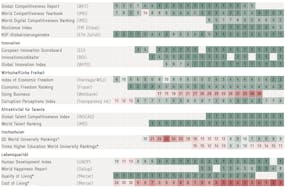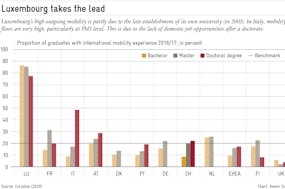Remarkable things are currently happening on the labor market. At the end of May, 98,000 unemployed people were registered with the regional employment centers, and the unemployment rate fell to a low 2.1%. At the same time the number of job vacancies was running at a record-high 114,000. For the first time since data collection started, the number of jobs on offer exceeded the number of unemployed people. As a result of the dried-up labor market, many companies are desperately seeking workers. Should we be concerned about the domestic labor market? And given the number of unfilled vacancies, are we seeing the free movement of persons with the EU losing its significance?
The employment statistics show that Swiss companies are having more difficulty than ever finding suitable skilled workers. They are also having more trouble than usual recruiting low-skilled workers. On the one hand, the shortage of skilled workers is structural in nature. In Switzerland, skilled – and even unskilled – workers have always been in short supply. Long-term trends such as demographic aging are exacerbating the problem. On the supply side, the generous pandemic measures (including extended periods of short-time working) are likely to continue having an impact on the shortage of staff. In addition, the matching of job seekers with vacancies is running less smoothly than before the pandemic.
Nonetheless, there is little to suggest that the staff shortage reflects major upheavals in the labor market. In Switzerland, there is no sign of a Great Resignation – a major wave of employees quitting their jobs as they are in the USA. In this country, occupational mobility is not unusually high. There is no statistically proven evidence that people are increasingly looking for new challenges as a result of the pandemic.
British planes grounded
For some, the current labor market situation is proof that the free movement of persons with the EU can no longer fulfill its promises. This view is too short-sighted. The relevant question is this: How acute would the situation on the labor market be if we didn’t have free movement of persons? In this regard, it’s worth taking a look across the English Channel. Unemployment in the UK is at a 50-year low, and job vacancies also exceeded unemployment figures for the first time in the first quarter of this year. But that’s where the parallels end.

The only reason the British labor market isn’t drying out is high immigration from non-EU countries: a pub in London. (Polina Volkova, Unsplash)
In contrast to Switzerland, more and more jobs remain unfilled in the UK, primarily because the labor force participation rate is shrinking. Since the outbreak of the pandemic, around 500,000 people have withdrawn from the labor market. A significant outflow of workers from the EU is also a factor. Brexit is making it more difficult to fill vacancies quickly. Meanwhile, staff shortages are bringing the economy to its knees. Planes are not taking off, and restaurants are closing. In March and April, the economy contracted. The only reason the labor market doesn’t seem to be drying up completely is that the country is benefiting from continued high immigration from non-EU countries. Even though it’s difficult to isolate the concrete effect of Brexit from parallel developments (especially the pandemic), all the data suggest that the withdrawal from the EU is exacerbating the tight employment situation.
In Switzerland, on the other hand, the labor force participation rate has returned to pre-pandemic levels. Immigration from the EU region remained stable throughout the pandemic – something that has also benefited the healthcare system. And at the moment it’s helping the economy flourish. However, the international environment is becoming gloomier. Once the economy slows down, the situation on the labor market is also likely to ease to a certain extent.
Lower fuel taxes or an immediate federal cash injection?
Inflation remains moderate in Switzerland compared with other countries. And yet, in Bern, politicians of all stripes are now trying to outdo each other with proposals to cushion a crisis that doesn’t really exist. The state should not additionally stimulate overheated demand by means of a “chèque fédéral” or any similar measure. Instead, it would be advisable to rely on the strength of two proven institutions: the SNB, which seems willing to counter inflationary pressures, and – to get back to what we’ve been talking about – the robust labor market (wage increases are to be expected), which will do its part to defuse the situation.
So, is everything fine? Not quite. Even if political activism is not indicated at present, there is definitely a need for action in the medium term. In order to effectively counteract the shortage of skilled workers, the existing domestic labor potential has to be better exploited. Proposals in this regard – such as improving work incentives for second earners by introducing individual taxation – are on the table. On the other hand, the time would be ripe to consider alternatives to the bureaucratic quota system for third-country workers. As a result of demographic developments in EU countries, the free movement of persons alone will not be enough to satisfy Swiss labor market’s needs for skilled workers. So in the future, demand for human capital will increasingly have to be met from outside the European area. Here there is untapped potential in terms of migration policy. And – despite Brexit – there is certainly something we can learn from the British.






